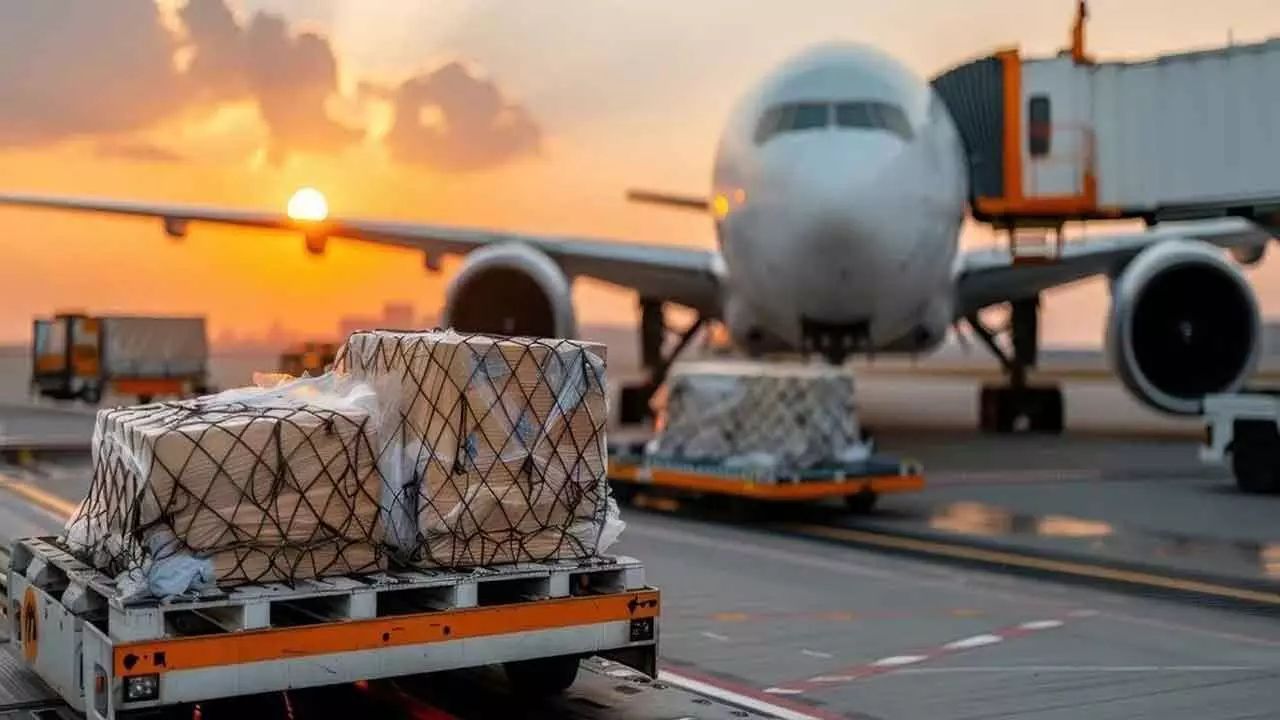ICRA Expects Indian Air Cargo Volumes To Scale New Highs Next Fiscal
Airport infra outlook will be stable with revenues likely to grow by around 14% YoY in FY2025
ICRA Expects Indian Air Cargo Volumes To Scale New Highs Next Fiscal

Deloitte India's Sustainable Aviation Fuel (SAF) report also stated that, with India’s abundant feedstock for SAF and significant exposure to Aviation Turbine Fuel (ATF) exports, the country is well-positioned to capitalize on the growing global demand for SAF
ICRA projects the overall air cargo volumes to witness healthy growth of around 9-11 per cent Y o Y to around 3.6-3.7 million tonnes in FY2025, supported by 11-13 per cent expansion in international and 4-6 per cent growth in domestic cargo. The international cargo volumes have seen a muted Y o Y rise of one per cent in H1 FY2024 on the back of the slowdown in the global economy and geo-political conflicts. However, the international cargo volumes have seen a healthy expansion of 18 per cent in H2 FY2024, amid the Red Sea crisis, which started in October 2023. Consequently, the seaborne cargo traffic was impacted, which in turn benefitted international air cargo traffic.
Giving more insights, Vinay Kumar G, Vice-President and Sector Head (Corporate Ratings), ICRA, said: “The cargo volumes were relatively less impacted due to Covid in FY2021, compared to passenger traffic. Moreover, the recovery was relatively swifter with cargo volumes recovering to 95 per cent of the pre-pandemic levels in FY2022 compared to 55 per cent in passenger traffic. This was supported by higher growth in international cargo on account of the export of Covid-related vaccines and higher merchandise exports in FY2022. While the growth in cargo volumes has slowed down during the FY2023-H1 FY2024 period, it has bounced back handsomely in the last 12 months, since the start of the Red Sea crisis. The international cargo volumes have increased by 18 per cent YoY and 20 per cent Y o Y during 5M FY2025 and are expected to increase by a further 11-13 per cent Y o Y to touch new highs in FY2025.”
Commenting on the airport operators’ performance, Extending his opinion, he pointed out that “ICRA’s outlook on airport infrastructure is stable with revenues of ICRA’s likely to grow by around 12-14% YoY in FY2025, supported by the sustained improvement in both domestic and international passenger traffic, increase in tariffs at some of the major airports and ramp-up in non-aeronautical revenues. With healthy profitability margins, the debt coverage metrics are expected to remain comfortable with DSCR and interest cover above two times and four times, respectively in the medium term, despite higher interest outgo with the commercialization of the capex program at some of the key airports. The credit profile of airport operators is projected to remain strong, supported by healthy accruals and comfortable liquidity.”
“Air cargo needs a technology disruption to meet the rising demands of the future, especially the last mile delivery. Blockchain technology in air cargo will be the next wave of tech disruption soon. This will also give an additional edge to air cargo already leading in the logistics industry. India is the powerhouse of technology and air cargo businesses should focus on its young minds. They are tech savvy and constantly creating technologies that would better the business process. I firmly believe that India is the country where this tech disruption will come from,” he added.
Noting the significant growth of India’s air cargo market, driven by a thriving e-commerce sector, Mirchandani pointed out the role of collaborations and mergers.
He said “I see e-commerce, courier and cargo as separate entities and will always remain that way in the air logistics business. Buzzwords in air cargo are third party logistics (3PL) and last mile delivery, so collaborations and mergers are needed for air cargo businesses to stay ahead of the curve. Without mergers, last mile deliveries would be the toughest for air cargo.”
Recently, Deloitte India's Sustainable Aviation Fuel (SAF) report also stated that, with India’s abundant feedstock for SAF and significant exposure to Aviation Turbine Fuel (ATF) exports, the country is well-positioned to capitalize on the growing global demand for SAF.
“The world needs sustainable aviation and Sky One is heavily invested in it. We have planted 150,000 trees in Uganda for our carbon credits. The air cargo industry needs to offset carbon credits that they are committed to. Air cargo businesses have to invest in green firms to secure the future of our planet.” he concludes.
“There is a maturity in the market which stems from airlines being better prepared this year as well as there being clearer rules in place between shippers and forwarders, and forwarders and airlines. This is good for relationships – and good for consumers. Rates are still elevated versus a year ago, but despite strong demand, rising load factor, and only a modest increase in supply, they are not going crazy. Lessons have been learned and people are looking for healthy, reasonable rates on both sides.
“This puts air cargo demand safely on course to report double-digit growth in 2024, and not even zero growth in November or December is going to disrupt this,” Vinay Kumar added.

